Fleurs du Mal Magazine



William Shakespeare
(1564-1616)
To be, or not to be
To be, or not to be: that is the question:
Whether ’tis nobler in the mind to suffer
The slings and arrows of outrageous fortune,
Or to take arms against a sea of troubles,
And by opposing end them? To die: to sleep:
No more; and by a sleep to say we end
The heartache and the thousand natural shocks
That flesh is heir to,–‘t is a consummation
Devoutly to be wish’d. To die, to sleep;
To sleep: perchance to dream: ay, there’s the rub:
For in that sleep of death what dreams may come,
When we have shuffled off this mortal coil,
Must give us pause: there’s the respect
That makes calamity of so long life;
For who would bear the whips and scorns of time,
The oppressor’s wrong, the proud man’s contumely,
The pangs of despised love, the law’s delay,
The insolence of office and the spurns
That patient merit of the unworthy takes,
When he himself might his quietus make
With a bare bodkin? who would fardels bear,
To grunt and sweat under a weary life,
But that the dread of something after death,
The undiscover’d country from whose bourn
No traveller returns, puzzles the will
And makes us rather bear those ills we have
Than fly to others that we know not of?
Thus conscience does make cowards of us all;
And thus the native hue of resolution
Is sicklied o’er with the pale cast of thought,
And enterprises of great pith and moment
With this regard their currents turn awry,
And lose the name of action.
William Shakespeare, “Hamlet”, Act 3 scene 1
Shakespeare 400 (1616 – 2016)
fleursdumal.nl magazine
More in: Archive S-T, Shakespeare, William
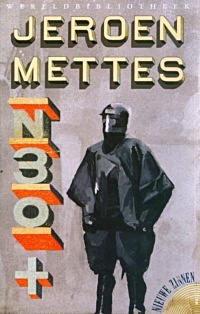 Perdu Programma — vrijdag 16 dec 2016 – 20:00 – N30x31 /// I.M. Jeroen Mettes
Perdu Programma — vrijdag 16 dec 2016 – 20:00 – N30x31 /// I.M. Jeroen Mettes
Een avond over het werk van Jeroen Mettes
Aanvang: 20.00 uur, deur open: 19.30 uur – Entree: 7 / 5 euro (korting geldt voor studenten, stadspashouders, vrienden van Perdu, VvL-leden). Met Alfred Schaffer, Samuel Vriezen, Rozalie Hirs, Hannah van Binsbergen, Fiep van Bodegom, Max Urai, Tonnus Oosterhoff, Johan Herrenberg, Roelof ten Napel, Frans-Willem Korsten, Anne van de Wetering, Lieke Marsman, Maarten van der Graaff, Lara Staal, Saskia de Jong, Çağlar Köseoğlu, Zohra Beldman, Mathijs Tratsaert, Arno van Vlierberghe, Dominique de Groen, Nadia de Vries, Bram Ieven, Geert Buelens, Aafke Romeijn, Siebe Bluijs, Sophie van den Bergh, Maartje Smits, Frank Keizer, Daniël Rovers, Obe Alkema & Dean Bowen.
De zon gaat onder en in de vijver drijven zwanen, alsof ze van hout zijn, stil tussen de oevers. Terwijl m’n browser ’n applet laadt, laat ik de jaloezieën neer. Ik zag een man – een mens met een gezicht en een geslacht en een manier van kleden en fietsen – en ik dacht: daar gaat een zin! (J.M.)
 Jeroen Mettes (Eindhoven 1978 – Den Haag 2006) was een Nederlandse dichter, essayist en blogger.
Jeroen Mettes (Eindhoven 1978 – Den Haag 2006) was een Nederlandse dichter, essayist en blogger.
Jeroen Mettes groeide op in Valkenswaard, studeerde filosofie in Utrecht en literatuurwetenschap aan de Universiteit Leiden, waar hij tot 2006 aan een proefschrift werkte over poëtisch ritme.
In 1999 begon hij aan een lang prozagedicht dat hij de naam N30 gaf. Dat was de codenaam van de anti- of andersglobalistische protesten in Seattle tijdens de onderhandelingen van de WTO. De betogers eisten een wereldwijde erkenning van eerlijke handel, vakbonden en milieuwetgeving. Zeven jaar later, in 2006, was er een gedicht ontstaan van zo’n 60.000 woorden lang.
In 2005 startte Jeroen Mettes het blog Poëzienotities. Belangrijk onderdeel van dat blog werd het Dichtersalfabet. Mettes besprak – in alfabetische volgorde – op zijn blog de poëziebundels die hij aantrof in boekhandel Verwijs in zijn woonplaats Den Haag. Hij begon met de A van Anne van Amstel, en zou eindigen bij de G van Goudeseune. Als dichter debuteerde Jeroen Mettes in het tijdschrift Parmentier met de reeks van vier gedichten getiteld ‘In de sfeer van het gestelde’. Als jonge twintiger had hij al prozabijdragen geleverd aan onder meer de tijdschriften Zoetermeer en Passionate.
Eind 2005 trad Mettes toe tot de redactie van het tijdschrift yang (nu nY). Hij was ook vast medewerker van het tijdschrift Parmentier.
Op 21 september 2006 plaatste hij een lege post op zijn blog. Diezelfde dag maakte hij thuis in Den Haag een einde aan zijn leven. Hij liet naast zijn gedichten, essays en zijn blog, een ver gevorderd proefschrift na, met als werktitel The Poetry of the Formless.
# Meer info op website n30.nl blog
Een zekere gerichte vernietiging laat groeven en kraters achter die een kaart schetsen voor een volgend avontuur. Pounds periplum: varend de kusten in kaart brengen, immanente plaatsbepaling. En met de kaart verandert het terrein, met het gedicht verandert de geschiedenis. (J.M.)
fleursdumal.nl magazineforartandliterature
More in: Archive M-N, Archive M-N, Jeroen Mettes, Mettes, Jeroen
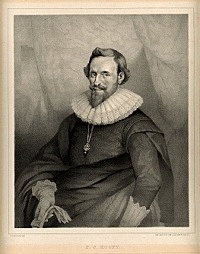 Het bestuur van de Stichting P.C. Hooft-prijs voor Letterkunde heeft maandag 12 december besloten de P.C. Hooft-prijs 2017 toe te kennen aan Bas Heijne (Nijmegen, 1960).
Het bestuur van de Stichting P.C. Hooft-prijs voor Letterkunde heeft maandag 12 december besloten de P.C. Hooft-prijs 2017 toe te kennen aan Bas Heijne (Nijmegen, 1960).
Deze oeuvreprijs is dit jaar bestemd voor beschouwend proza en wordt uitgereikt op een feestelijke bijeenkomst in het Literatuurmuseum, op donderdag 18 mei 2017, 3 dagen vóór de sterfdag van de naamgever van de prijs, de dichter P.C. Hooft (1581-1647), onze grootste renaissancedichter.
De P.C. Hooft-prijs 2017 voor het gehele oeuvre van Bas Heijne is toegekend op voordracht van een jury bestaande uit Jacqueline Bel, Kees ’t Hart, Kristien Hemmerechts, David Van Reybrouck (voorzitter) en Dirk van Weelden. Recente eerdere laureaten in het genre beschouwend proza waren Willem Jan Otten (2014), H.J.A. Hofland (2011) en Abram de Swaan (2008). Aan de prijs is een bedrag verbonden van € 60.000.
 Uit het juryrapport: “Bas Heijne is een schrijver met een bijzondere positie als columnist en essayist, die over een enorme verscheidenheid aan actuele onderwerpen en kwesties schrijft. Hij volgt de hedendaagse cultuur op een geëngageerde manier. Hij schrijft over haatvloggers en De Ring van Wagner, over Hollywoodfilms en Couperus, over Europese referenda en de toekomst van de roman. Zijn werk geeft een vernieuwende impuls aan wat literatuur in maatschappelijke zin betekenen kan. […] Vooral de vorm waarin hij dat doet is bijzonder: hij schrijft als een denker én denkt als een lezer.”
Uit het juryrapport: “Bas Heijne is een schrijver met een bijzondere positie als columnist en essayist, die over een enorme verscheidenheid aan actuele onderwerpen en kwesties schrijft. Hij volgt de hedendaagse cultuur op een geëngageerde manier. Hij schrijft over haatvloggers en De Ring van Wagner, over Hollywoodfilms en Couperus, over Europese referenda en de toekomst van de roman. Zijn werk geeft een vernieuwende impuls aan wat literatuur in maatschappelijke zin betekenen kan. […] Vooral de vorm waarin hij dat doet is bijzonder: hij schrijft als een denker én denkt als een lezer.”
De P.C. Hooft-prijs voor Letterkunde behoort tot de belangrijke literatuurprijzen in het Nederlandse taalgebied. Hij wordt uitgereikt door de Stichting P.C. Hooft-prijs voor Letterkunde. Deze oeuvreprijs wordt jaarlijks afwisselend toegekend voor proza, essayistiek en poëzie. De P.C. Hooft-prijs is ingesteld in 1947. In dat jaar werd op 21 mei de 300ste sterfdag van Pieter Corneliszoon Hooft herdacht. De prijs wordt jaarlijks rond de sterfdag van P.C. Hooft uitgereikt en bedraagt € 60.000. Daarnaast looft de Stichting sinds 1988 de driejaarlijkse Theo Thijssen-prijs uit voor jeugdliteratuur. De prijs bedraagt € 60.000.
Vanaf september 2007 wordt de driejaarlijkse Max Velthuijs-prijs voor boekillustratoren uitgereikt. Ook deze prijs bedraagt € 60.000.’
# Meer informatie op website PC Hooftprijs
fleursdumal.nl magazine
More in: Archive G-H, Art & Literature News, Bas Heijne, NONFICTION: ESSAYS & STORIES, PRESS & PUBLISHING, The Art of Reading
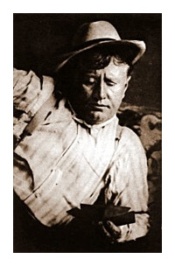 The Memento
The Memento
by O. Henry
Miss Lynnette D’Armande turned her back on Broadway. This was but tit for tat, because Broadway had often done the same thing to Miss D’Armande. Still, the “tats” seemed to have it, for the ex-leading lady of the “Reaping the Whirlwind” Company had everything to ask of Broadway, while there was no vice versa.
So Miss Lynnette D’Armande turned the back of her chair to her window that overlooked Broadway, and sat down to stitch in time the lisle-thread heel of a black silk stocking. The tumult and glitter of the roaring Broadway beneath her window had no charm for her; what she greatly desired was the stifling air of a dressing-room on that fairyland street and the roar of an audience gathered in that capricious quarter. In the meantime, those stockings must not be neglected. Silk does wear out so, but—after all, isn’t it just the only goods there is?
The Hotel Thalia looks on Broadway as Marathon looks on the sea. It stands like a gloomy cliff above the whirlpool where the tides of two great thoroughfares clash. Here the player-bands gather at the end of their wanderings, to loosen the buskin and dust the sock. Thick in the streets around it are booking- offices, theatres, agents, schools, and the lobster-palaces to which those thorny paths lead.
Wandering through the eccentric halls of the dim and fusty Thalia, you seem to have found yourself in some great ark or caravan about to sail, or fly, or roll away on wheels. About the house lingers a sense of unrest, of expectation, of transientness, even of anxiety and apprehension. The halls are a labyrinth. Without a guide you wander like a lost soul in a Sam Loyd puzzle.
Turning any corner, a dressing-sack or a cul-de-sac may bring you up short. You meet alarming tragedians stalking in bath-robes in search of rumoured bath-rooms. From hundreds of rooms come the buzz of talk, scraps of new and old songs, and the ready laughter of the convened players.
Summer has come; their companies have disbanded, and they take their rest in their favourite caravansary, while they besiege the managers for engagements for the coming season.
At this hour of the afternoon the day’s work of tramping the rounds of the agents’ offices is over. Past you, as you ramble distractedly through the mossy halls, flit audible visions of houris, with veiled, starry eyes, flying tag-ends of things, and a swish of silk, bequeathing to the dull hallways an odour of gaiety and a memory of frangipanni. Serious young comedians, with versatile Adam’s apples, gather in doorways and talk of Booth. Far-reaching from somewhere comes the smell of ham and red cabbage, and the crash of dishes on the American plan.
The indeterminate hum of life in the Thalia is enlivened by the discreet popping—at reasonable and salubrious intervals—of beer-bottle corks. Thus punctuated, life in the genial hostel scans easily—the comma being the favourite mark, semicolons frowned upon, and periods barred.
Miss D’Armande’s room was a small one. There was room for her rocker between the dresser and the wash-stand if it were placed longitudinally. On the dresser were its usual accoutrements, plus the ex- leading lady’s collected souvenirs of road engagements and photographs of her dearest and best professional friends.
At one of these photographs she looked twice or thrice as she darned, and smiled friendlily.
“I’d like to know where Lee is just this minute,” she said, half-aloud.
If you had been privileged to view the photograph thus flattered, you would have thought at the first glance that you saw the picture of a many-petalled, white flower, blown through the air by a storm. But the floral kingdom was not responsible for that swirl of petalous whiteness.
You saw the filmy, brief skirt of Miss Rosalie Ray as she made a complete heels-over-head turn in her wistaria-entwined swing, far out from the stage, high above the heads of the audience. You saw the
O. Henry
(1862 – 1910)
The Memento
fleursdumal.nl magazine
More in: Archive G-H, Henry, O.
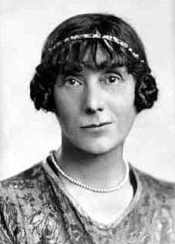
Jessie Pope
(1868 – 1941)
War Girls
‘There’s the girl who clips your ticket for the train,
And the girl who speeds the lift from floor to floor,
There’s the girl who does a milk-round in the rain,
And the girl who calls for orders at your door.
Strong, sensible, and fit,
They’re out to show their grit,
And tackle jobs with energy and knack.
No longer caged and penned up,
They’re going to keep their end up
‘Til the khaki soldier boys come marching back.
There’s the motor girl who drives a heavy van,
There’s the butcher girl who brings your joint of meat,
There’s the girl who calls ‘All fares please!’ like a man,
And the girl who whistles taxi’s up the street.
Beneath each uniform
Beats a heart that’s soft and warm,
Though of canny mother-wit they show no lack;
But a solemn statement this is,
They’ve no time for love and kisses
Till the khaki soldier boys come marching back.
Jessie Pope
fleursdumal.nl magazine
More in: *War Poetry Archive, Archive O-P, CLASSIC POETRY, WAR & PEACE
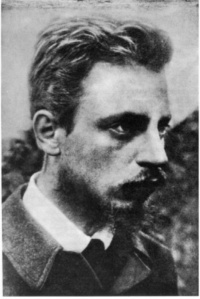
Rainer Maria Rilke
(1875 – 1926)
Gesang der Frauen an den Dichter
Sieh, wie sich alles auftut: so sind wir;
denn wir sind nichts als solche Seligkeit.
Was Blut und Dunkel war in einem Tier,
das wuchs in uns zur Seele an und schreit
als Seele weiter. Und es schreit nach dir.
Du freilich nimmst es nur in dein Gesicht,
als sei es Landschaft: sanft und ohne Gier.
Und darum meinen wir, du bist es nicht,
nach dem es schreit. Und doch, bist du nicht der,
an den wir uns ganz ohne Rest verlören?
Und werden wir in irgendeinem mehr?
Mit uns geht das Unendliche vorbei.
Du aber sei, du Mund, daß wir es hören,
du aber, du Uns-Sagender: du sei.
Rainer Maria Rilke Gedichte
fleursdumal.nl magazine
More in: Archive Q-R, Rilke, Rainer Maria
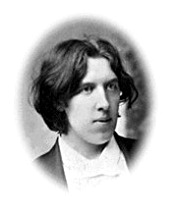 Oscar Wilde
Oscar Wilde
(1854 – 1900)
The Doer of Good
It was night-time and He was alone.
And He saw afar-off the walls of a round city and went towards the city.
And when He came near He heard within the city the tread of the feet of joy, and the laughter of the mouth of gladness and the loud noise of many lutes. And He knocked at the gate and certain of the gatekeepers opened to Him.
And He beheld a house that was of marble and had fair pillars of marble before it. The pillars were hung with garlands, and within and without there were torches of cedar. And He entered the house.
And when He had passed through the hall of chalcedony and the hall of jasper, and reached the long hall of feasting, He saw lying on a couch of sea-purple one whose hair was crowned with red roses and whose lips were red with wine.
And He went behind him and touched him on the shoulder and said to him, ‘Why do you live like this?’
And the young man turned round and recognised Him, and made answer and said, ‘But I was a leper once, and you healed me. How else should I live?’
And He passed out of the house and went again into the street.
And after a little while He saw one whose face and raiment were painted and whose feet were shod with pearls. And behind her came, slowly as a hunter, a young man who wore a cloak of two colours. Now the face of the woman was as the fair face of an idol, and the eyes of the young man were bright with lust.
And He followed swiftly and touched the hand of the young man and said to him, ‘Why do you look at this woman and in such wise?’
And the young man turned round and recognised Him and said, ‘But I was blind once, and you gave me sight. At what else should I look?’
And He ran forward and touched the painted raiment of the woman and said to her, ‘Is there no other way in which to walk save the way of sin?’
And the woman turned round and recognised Him, and laughed and said, ‘But you forgave me my sins, and the way is a pleasant way.
And He passed out of the city.
And when He had passed out of the city He saw seated by the roadside a young man who was weeping.
And He went towards him and touched the long locks of his hair and said to him, ‘Why are you weeping?’
And the young man looked up and recognised Him and made answer, ‘But I was dead once and you raised me from the dead. What else should I do but weep?’
Oscar Wilde, 1894
fleursdumal.nl magazine
More in: Archive W-X, Wilde, Oscar, Wilde, Oscar
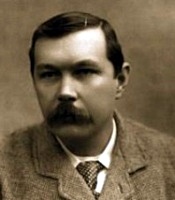 The Adventure of The Sussex Vampire
The Adventure of The Sussex Vampire
by Arthur Conan Doyle
Holmes had read carefully a note which the last post had brought him. Then, with the dry chuckle which was his nearest approach to a laugh, he tossed it over to me.
“For a mixture of the modern and the medieval, of the practical and of the wildly fanciful, I think this is surely the limit,” said he. “What do you make of it, Watson?”
I read as follows:
46, OLD JEWRY,
Nov. 19th.
Re Vampires
SIR:
Our client, Mr. Robert Ferguson, of Ferguson and
Muirhead, tea brokers, of Mincing Lane, has made some
inquiry from us in a communication of even date concerning
vampires. As our firm specializes entirely upon the as
sessment of machinery the matter hardly comes within our
purview, and we have therefore recommended Mr. Fergu
son to call upon you and lay the matter before you. We
have not forgotten your successful action in the case of
Matilda Briggs.
We are, sir,
Faithfully yours,
MORRISON, MORRISON, AND DODD.
per E. J. C.
“Matilda Briggs was not the name of a young woman, Watson,” said Holmes in a reminiscent voice. “It was a ship which is associated with the giant rat of Sumatra, a story for which the world is not yet prepared. But what do we know about vampires? Does it come within our purview either? Anything is better than stagnation, but really we seem to have been switched on to a Grimms’ fairy tale. Make a long arm, Watson, and see what V has to say.”
I leaned back and took down the great index volume to which he referred. Holmes balanced it on his knee, and his eyes moved slowly and lovingly over the record of old cases, mixed with the accumulated information of a lifetime.
“Voyage of the Gloria Scott,” he read. “That was a bad business. I have some recollection that you made a record of it, Watson, though I was unable to congratulate you upon the result. Victor Lynch, the forger. Venomous lizard or gila. Remarkable case, that! Vittoria, the circus belle. Vanderbilt and the Yeggman. Vipers. Vigor, the Hammersmith wonder. Hullo! Hullo! Good old index. You can’t beat it. Listen to this, Watson. Vampirism in Hungary. And again, Vampires in Transylvania.” He turned over the pages with eagerness, but after a short intent perusal he threw down the great book with a snarl of disappointment.
“Rubbish, Watson, rubbish! What have we to do with walking corpses who can only be held in their grave by stakes driven through their hearts? It’s pure lunacy.”
“But surely,” said I, “the vampire was not necessarily a dead man? A living person might have the habit. I have read, for example, of the old sucking the blood of the young in order to retain their youth.”
“You are right, Watson. It mentions the legend in one of these references. But are we to give serious attention to such things? This agency stands flat-footed upon the ground, and there it must remain. The world is big enough for us. No ghosts need apply. I fear that we cannot take Mr. Robert Ferguson very seriously. Possibly this note may be from him and may throw some light upon what is worrying him.”
He took up a second letter which had lain unnoticed upon the table while he had been absorbed with the first. This he began to read with a smile of amusement upon his face which gradually faded away into an expression of intense interest and concentration. When he had finished he sat for some little time lost in thought with the letter dangling from his fingers. Finally, with a start, he aroused himself from his reverie.
“Cheeseman’s, Lamberley. Where is Lamberley, Watson?”
“lt is in Sussex, South of Horsham.”
“Not very far, eh? And Cheeseman’s?”
“I know that country, Holmes. It is full of old houses which are named after the men who built them centuries ago. You get Odley’s and Harvey’s and Carriton’s — the folk are forgotten but their names live in their houses.”
“Precisely,” said Holmes coldly. It was one of the peculiarities of his proud, self-contained nature that though he docketed any fresh information very quietly and accurately in his brain, he seldom made any acknowledgment to the giver. “I rather fancy we shall know a good deal more about Cheeseman’s, Lamberley, before we are through. The letter is, as I had hoped, from Robert Ferguson. By the way, he claims acquaintance with you.”
“With me!”
“You had better read it.”
He handed the letter across. It was headed with the address quoted.
DEAR MR HOLMES [it said]:
I have been recommended to you by my lawyers, but
indeed the matter is so extraordinarily delicate that it is most
difficult to discuss. It concerns a friend for whom I am
acting. This gentleman married some five years ago a Peruvian
lady the daughter of a Peruvian merchant, whom he had
met in connection with the importation of nitrates. The lady
was very beautiful, but the fact of her foreign birth and of
her alien religion always caused a separation of interests and
of feelings between husband and wife, so that after a time
his love may have cooled towards her and he may have
come to regard their union as a mistake. He felt there were
sides of her character which he could never explore or
understand. This was the more painful as she was as loving
a wife as a man could have — to all appearance absolutely
devoted.
Now for the point which I will make more plain when we
meet. Indeed, this note is merely to give you a general idea
of the situation and to ascertain whether you would care to
interest yourself in the matter. The lady began to show
some curious traits quite alien to her ordinarily sweet and
gentle disposition. The gentleman had been married twice
and he had one son by the first wife. This boy was now
fifteen, a very charming and affectionate youth, though
unhappily injured through an accident in childhood. Twice
the wife was caught in the act of assaulting this poor lad in
the most unprovoked way. Once she struck him with a stick
and left a great weal on his arm.
This was a small matter, however, compared with her
conduct to her own child, a dear boy just under one year of
age. On one occasion about a month ago this child had
been left by its nurse for a few minutes. A loud cry from the
baby, as of pain, called the nurse back. As she ran into the
room she saw her employer, the lady, leaning over the baby
and apparently biting his neck. There was a small wound in
the neck from which a stream of blood had escaped. The
nurse was so horrified that she wished to call the husband,
but the lady implored her not to do so and actually gave her
five pounds as a price for her silence. No explanation was
ever given, and for the moment the matter was passed over.
It left, however, a terrible impression upon the nurse’s
mind, and from that time she began to watch her mistress
closely and to keep a closer guard upon the baby, whom she
tenderly loved. It seemed to her that even as she watched
the mother, so the mother watched her, and that every time
she was compelled to leave the baby alone the mother was
waiting to get at it. Day and night the nurse covered the
child, and day and night the silent, watchful mother seemed
to be lying in wait as a wolf waits for a lamb. It must read
most incredible to you, and yet I beg you to take it seri
ously, for a child’s life and a man’s sanity may depend
upon it.
At last there came one dreadful day when the facts could
no longer be concealed from the husband. The nurse’s nerve
had given way; she could stand the strain no longer, and
she made a clean breast of it all to the man. To him it
seemed as wild a tale as it may now seem to you.He knew
his wife to be a loving wife, and, save for the assaults
upon her stepson, a loving mother. Why, then, should
she wound her own dear little baby? He told the nurse that
she was dreaming, that her suspicions were those of a
lunatic, and that such libels upon her mistress were not to be
tolerated. While they were talking a sudden cry of pain was
heard. Nurse and master rushed together to the nursery.
Imagine his feelings, Mr. Holmes, as he saw his wife rise
from a kneeling position beside the cot and saw blood upon
the child’s exposed neck and upon the sheet. With a cry of
horror, he turned his wife’s face to the light and saw blood
all round her lips. It was she — she beyond all question –
who had drunk the poor baby’s blood.
So the matter stands. She is now confined to her room.
There has been no explanation. The husband is half de
mented. He knows, and I know, little of vampirism beyond
the name. We had thought it was some wild tale of foreign
parts. And yet here in the very heart of the English Sussex –
well, all this can be discussed with you in the morning. Will
you see me? Will you use your great powers in aiding a
distracted man? If so, kindly wire to Ferguson, Cheeseman’s,
Lamberley, and I will be at your rooms by ten o’clock.
Yours faithfully,
ROBERT FERGUSON
P. S. I believe your friend Watson played Rugby for
Blackheath when I was three-quarter for Richmond. It is the
only personal introduction which I can give.
“Of course I remembered him,” said I as I laid down the letter. “Big Bob Ferguson, the finest three-quarter Richmond ever had. He was always a good-natured chap. It’s like him to be so concerned over a friend’s case.”
Holmes looked at me thoughtfully and shook his head.
“I never get your limits, Watson,” said he. “There are unexplored possibilities about you. Take a wire down, like a good fellow. ‘Will examine your case with pleasure.’ “
“Your case!”
“We must not let him think that this agency is a home for the weak-minded. Of course it is his case. Send him that wire and let the matter rest till morning.”
Promptly at ten o’clock next morning Ferguson strode into our room. I had remembered him as a long, slab-sided man with loose limbs and a fine turn of speed which had carried him round many an opposing back. There is surely nothing in life more painful than to meet the wreck of a fine athlete whom one has known in his prime. His great frame had fallen in, his flaxen hair was scanty, and his shoulders were bowed. I fear that I roused corresponding emotions in him.
“Hullo, Watson,” said he, and his voice was still deep and hearty. “You don’t look quite the man you did when I threw you over the ropes into the crowd at the Old Deer Park. I expect I have changed a bit also. But it’s this last day or two that has aged me. I see by your telegram, Mr. Holmes, that it is no use my pretending to be anyone’s deputy.” .
“It is simpler to deal direct,” said Holmes.
“Of course it is. But you can imagine how difficult it is when you are speaking of the one woman whom you are bound to protect and help. What can I do? How am I to go to the police with such a story? And yet the kiddies have got to be protected. Is it madness, Mr. Holmes? Is it something in the blood? Have you any similar case in your experience? For God’s sake, give me some advice, for I am at my wit’s end.”
“Very naturally, Mr. Ferguson. Now sit here and pull yourself together and give me a few clear answers. I can assure you that I am very far from being at my wit’s end, and that I am confident we shall find some solution. First of all, tell me what steps you have taken. Is your wife still near the children?”
“We had a dreadful scene. She is a most loving woman, Mr. Holmes. If ever a woman loved a man with all her heart and soul, she loves me. She was cut to the heart that I should have discovered this horrible, this incredible, secret. She would not even speak. She gave no answer to my reproaches, save to gaze at me with a sort of wild, despairing look in her eyes. Then she rushed to her room and locked herself in. Since then she has refused to see me. She has a maid who was with her before her marriage, Dolores by name — a friend rather than a servant. She takes her food to her.”
“Then the child is in no immediate danger?”
“Mrs. Mason, the nurse, has sworn that she will not leave it night or day. I can absolutely trust her. I am more uneasy about poor little Jack, for, as I told you in my note, he has twice been assaulted by her.”
“But never wounded?”
“No, she struck him savagely. It is the more terrible as he is a poor little inoffensive cripple.” Ferguson’s gaunt features softened as he spoke of his boy. “You would think that the dear lad’s condition would soften anyone’s heart. A fall in childhood and a twisted spine, Mr. Holmes. But the dearest, most loving heart within.”
Holmes had picked up the letter of yesterday and was reading it over. “What other inmates are there in your house, Mr. Ferguson?”
“Two servants who have not been long with us. One stablehand, Michael, who sleeps in the house. My wife, myself, my boy Jack, baby, Dolores, and Mrs. Mason. That is all.”
“I gather that you did not know your wife well at the time of your marriage?”
“I had only known her a few weeks.”
“How long had this maid Dolores been with her?”
“Some years.”
“Then your wife’s character would really be better known by Dolores than by you?”
“Yes, you may say so.”
Holmes made a note.
“I fancy,” said he, “that I may be of more use at Lamberley than here. It is eminently a case for personal investigation. If the lady remains in her room, our presence could not annoy or inconvenience her. Of course, we would stay at the inn.”
Ferguson gave a gesture of relief.
“It is what I hoped, Mr. Holmes. There is an excellent train at two from Victoria if you could come.”
“Of course we could come. There is a lull at present. I can give you my undivided energies. Watson, of course, comes with us. But there are one or two points upon which I wish to be very sure before I start. This unhappy lady, as I understand it, has appeared to assault both the children, her own baby and your little son?”
“That is so.”
“But the assaults take different forms, do they not? She has beaten your son.”
“Once with a stick and once very savagely with her hands.”
“Did she give no explanation why she struck him?”
“None save that she hated him. Again and again she said so.”
“Well, that is not unknown among stepmothers. A posthumous jealousy, we will say. Is the lady jealous by nature?”
“Yes, she is very jealous — jealous with all the strength of her fiery tropical love.”
“But the boy — he is fifteen, I understand, and probably very developed in mind, since his body has been circumscribed in action. Did he give you no explanation of these assaults?”
“No, he declared there was no reason.”
“Were they good friends at other times?”
“No, there was never any love between them.”
“Yet you say he is affectionate?”
“Never in the world could there be so devoted a son. My life is his life. He is absorbed in what I say or do.”
Once again Holmes made a note. For some time he sat lost in thought.
“No doubt you and the boy were great comrades before this second marriage. You were thrown very close together, were you not?”
“Very much so.”
“And the boy, having so affectionate a nature, was devoted, no doubt, to the memory of his mother?”
“Most devoted.”
“He would certainly seem to be a most interesting lad. There is one other point about these assaults. Were the strange attacks upon the baby and the assaults upon yow son at the same period?”
“In the first case it was so. It was as if some frenzy had seized her, and she had vented her rage upon both. In the second case it was only Jack who suffered. Mrs. Mason had no complaint to make about the baby.”
“That certainly complicates matters.”
“I don’t quite follow you, Mr. Holmes.”
“Possibly not. One forms provisional theories and waits for time or fuller knowledge to explode them. A bad habit, Mr. Ferguson, but human nature is weak. I fear that your old friend here has given an exaggerated view of my scientific methods. However, I will only say at the present stage that your problem does not appear to me to be insoluble, and that you may expect to find us at Victoria at two o’clock.”
It was evening of a dull, foggy November day when, having left our bags at the Chequers, Lamberley, we drove through the Sussex clay of a long winding lane and finally reached the isolated and ancient farmhouse in which Ferguson dwelt. It was a large, straggling building, very old in the centre, very new at the wings with towering Tudor chimneys and a lichen-spotted, high-pitched roof of Horsham slabs. The doorsteps were worn into curves, and the ancient tiles which lined the porch were marked with the rebus of a cheese and a man after the original builder. Within, the ceilings were corrugated with heavy oaken beams, and the uneven floors sagged into sharp curves. An odour of age and decay pervaded the whole crumbling building.
There was one very large central room into which Ferguson led us. Here, in a huge old-fashioned fireplace with an iron screen behind it dated 1670, there blazed and spluttered a splendid log fire.
The room, as I gazed round, was a most singular mixture of dates and of places. The half-panelled walls may well have belonged to the original yeoman farmer of the seventeenth century. They were ornamented, however, on the lower part by a line of well-chosen modern water-colours; while above, where yellow plaster took the place of oak, there was hung a fine collection of South American utensils and weapons, which had been brought, no doubt, by the Peruvian lady upstairs. Holmes rose, with that quick curiosity which sprang from his eager mind, and examined them with some care. He returned with his eyes full of thought.
“Hullo!” he cried. “Hullo!”
A spaniel had lain in a basket in the corner. It came slowly forward towards its master, walking with difficulty. Its hind legs moved irregularly and its tail was on the ground. It licked Ferguson’s hand.
“What is it, Mr. Holmes?”
“The dog. What’s the matter with it?”
“That’s what puzzled the vet. A sort of paralysis. Spinal meningitis, he thought. But it is passing. He’ll be all right soon — won’t you, Carlo?”
A shiver of assent passed through the drooping tail. The dog’s mournful eyes passed from one of us to the other. He knew that we were discussing his case.
“Did it come on suddenly?”
“In a single night.”
“How long ago?”
“It may have been four months ago.”
“Very remarkable. Very suggestive.”
“What do you see in it, Mr. Holmes?”
“A confirmation of what I had already thought.”
“For God’s sake, what do you think, Mr. Holmes? It may be a mere intellectual puzzle to you, but it is life and death to me! My wife a would-be murderer — my child in constant danger! Don’t play with me, Mr. Holmes. It is too terribly serious.”
The big Rugby three-quarter was trembling all over. Holmes put his hand soothingly upon his arm.
“I fear that there is pain for you, Mr. Ferguson, whatever the solution may be,” said he. “I would spare you all I can. I cannot say more for the instant, but before I leave this house I hope I may have something definite.”
“Please God you may! If you will excuse me, gentlemen, I will go up to my wife’s room and see if there has been any change.”
He was away some minutes, during which Holmes resumed his examination of the curiosities upon the wall. When our host returned it was clear from his downcast face that he had made no progress. He brought with him a tall, slim, brown-faced girl.
“The tea is ready, Dolores,” said Ferguson. “See that your mistress has everything she can wish.”
“She verra ill,” cried the girl, looking with indignant eyes at her master. “She no ask for food. She verra ill. She need doctor. I frightened stay alone with her without doctor.”
Ferguson looked at me with a question in his eyes.
“I should be so glad if I could be of use.”
“Would your mistress see Dr. Watson?”
“I take him. I no ask leave. She needs doctor.”
“Then I’ll come with you at once.”
I followed the girl, who was quivering with strong emotion, up the staircase and down an ancient corridor. At the end was an iron-clamped and massive door. It struck me as I looked at it that if Ferguson tried to force his way to his wife he would find it no easy matter. The girl drew a key from her pocket, and the heavy oaken planks creaked upon their old hinges. I passed in and she swiftly followed, fastening the door behind her.
On the bed a woman was lying who was clearly in a high fever. She was only half conscious, but as I entered she raised a pair of frightened but beautiful eyes and glared at me in apprehension. Seeing a stranger, she appeared to be relieved and sank back with a sigh upon the pillow. I stepped up to her with a few reassuring words, and she lay still while I took her pulse and temperature. Both were high, and yet my impression was that the condition was rather that of mental and nervous excitement than of any actual seizure.
“She lie like that one day, two day. I ‘fraid she die,” said the girl.
The woman turned her flushed and handsome face towards me.
“Where is my husband?”
“He is below and would wish to see you.”
“I will not see him. I will not see him.” Then she seemed to wander off into delirium. “A fiend! A fiend! Oh, what shall I do with this devil?”
“Can I help you in any way?”
“No. No one can help. It is finished. All is destroyed. Do what I will, all is destroyed.”
The woman must have some strange delusion. I could not see honest Bob Ferguson in the character of fiend or devil.
“Madame,” I said, “your husband loves you dearly. He is deeply grieved at this happening.”
Again she turned on me those glorious eyes.
“He loves me. Yes. But do I not love him? Do I not love him even to sacrifice myself rather than break his dear heart? That is how I love him. And yet he could think of me — he could speak of me so.”
“He is full of grief, but he cannot understand.”
“No, he cannot understand. But he should trust.”
“Will you not see him?” I suggested.
“No, no, I cannot forget those terrible words nor the look upon his face. I will not see him. Go now. You can do nothing for me. Tell him only one thing. I want my child. I have a right to my child. That is the only message I can send him.” She turned her face to the wall and would say no more.
I returned to the room downstairs, where Ferguson and Holmes still sat by the fire. Ferguson listened moodily to my account of the interview.
“How can I send her the child?” he said. “How do I know what strange impulse might come upon her? How can I ever forget how she rose from beside it with its blood upon her lips?” He shuddered at the recollection. “The child is safe with Mrs. Mason, and there he must remain.”
A smart maid, the only modern thing which we had seen in the house, had brought in some tea. As she was serving it the door opened and a youth entered the room. He was a remarkable lad, pale-faced and fair-haired, with excitable light blue eyes which blazed into a sudden flame of emotion and joy as they rested upon his father. He rushed forward and threw his arms round his neck with the abandon of a loving girl.
“Oh, daddy,” he cried, “I did not know that you were due yet. I should have been here to meet you. Oh, I am so glad to see you!”
Ferguson gently disengaged himself from the embrace with some little show of embarrassment.
“Dear old chap,” said he, patting the flaxen head with a very tender hand. “I came early because my friends, Mr. Holmes and Dr. Watson, have been persuaded to come down and spend an evening with us.”
“Is that Mr. Holmes, the detective?”
“Yes.”
The youth looked at us with a very penetrating and, as it seemed to me, unfriendly gaze.
“What about your other child, Mr. Ferguson?” asked Holmes. “Might we make the acquaintance of the baby?”
“Ask Mrs. Mason to bring baby down,” said Ferguson. The boy went off with a curious, shambling gait which told my surgical eyes that he was suffering from a weak spine. Presently he returned, and behind him came a tall, gaunt woman bearing in her arms a very beautiful child, dark-eyed, golden-haired, a wonderful mixture of the Saxon and the Latin. Ferguson was evidently devoted to it, for he took it into his arms and fondled it most tenderly.
“Fancy anyone having the heart to hurt him,” he muttered as he glanced down at the small, angry red pucker upon the cherub throat.
It was at this moment that I chanced to glance at Holmes and saw a most singular intentness in his expression. His face was as set as if it had been carved out of old ivory, and his eyes, which had glanced for a moment at father and child, were now fixed with eager curiosity upon something at the other side of the room. Following his gaze I could only guess that he was looking out through the window at the melancholy, dripping garden. It is true that a shutter had half closed outside and obstructed the view, but none the less it was certainly at the window that Holmes was fixing his concentrated attention. Then he smiled, and his eyes came back to the baby. On its chubby neck there was this small puckered mark. Without speaking, Holmes examined it with care. Finally he shook one of the dimpled fists which waved in front of him.
“Good-bye, little man. You have made a strange start in life. Nurse, I should wish to have a word with you in private.”
He took her aside and spoke earnestly for a few minutes. I only heard the last words, which were: “Your anxiety will soon, I hope, be set at rest.” The woman, who seemed to be a sour, silent kind of creature, withdrew with the child.
“What is Mrs. Mason like?” asked Holmes.
“Not very prepossessing externally, as you can see, but a heart of gold, and devoted to the child.”
“Do you like her, Jack?” Holmes turned suddenly upon the boy. His expressive mobile face shadowed over, and he shook his head.
“Jacky has very strong likes and dislikes,” said Ferguson, putting his arm round the boy. “Luckily I am one of his likes.”
The boy cooed and nestled his head upon his father’s breast. Ferguson gently disengaged him.
“Run away, little Jacky,” said he, and he watched his son with loving eyes until he disappeared. “Now, Mr. Holmes,” he continued when the boy was gone, “I really feel that I have brought you on a fool’s errand, for what can you possibly do save give me your sympathy? It must be an exceedingly delicate and complex affair from your point of view.”
“It is certainly delicate,” said my friend with an amused smile, “but I have not been struck up to now with its complexity. It has been a case for intellectual deduction, but when this original intellectual deduction is confirmed point by point by quite a number of independent incidents, then the subjective becomes objective and we can say confidently that we have reached our goal. I had, in fact, reached it before we left Baker Street, and the rest has merely been observation and confirmation.”
Ferguson put his big hand to his furrowed forehead.
“For heaven’s sake, Holmes,” he said hoarsely; “if you can see the truth in this matter, do not keep me in suspense. How do I stand? What shall I do? I care nothing as to how you have found your facts so long as you have really got them.”
“Certainly I owe you an explanation, and you shall have it. But you will permit me to handle the matter in my own way? Is the lady capable of seeing us, Watson?”
“She is ill, but she is quite rational.”
“Very good. It is only in her presence that we can clear the matter up. Let us go up to her.”
“She will not see me,” cried Ferguson.
“Oh, yes, she will,” said Holmes. He scribbled a few lines upon a sheet of paper.”You at least have the entree, Watson. Will you have the goodness to give the lady this note?”
I ascended again and handed the note to Dolores, who cautiously opened the door. A minute later I heard a cry from within, a cry in which joy and surprise seemed to be blended. Dolores looked out.
“She will see them. She will leesten,” said she.
At my summons Ferguson and Holmes came up. As we entered the room Ferguson took a step or two towards his wife, who had raised herself in the bed, but she held out her hand to repulse him. He sank into an armchair, while Holmes seated himself beside him, after bowing to the lady, who looked at him with wide-eyed amazement.
“I think we can dispense with Dolores,” said Holmes. “Oh, very well, madame, if you would rather she stayed I can see no objection. Now, Mr. Ferguson, I am a busy man wlth many calls, and my methods have to be short and direct. The swiftest surgery is the least painful. Let me first say what will ease your mind. Your wife is a very good, a very loving, and a very ill-used woman.”
Ferguson sat up with a cry of joy.
“Prove that, Mr. Holmes, and I am your debtor forever.”
“I will do so, but in doing so I must wound you deeply in another direction.”
“I care nothing so long as you clear my wife. Everything on earth is insignificant compared to that.”
“Let me tell you, then, the train of reasoning which passed through my mind in Baker Street. The idea of a vampire was to me absurd. Such things do not happen in criminal practice in England. And yet your observation was precise. You had seen the lady rise from beside the child’s cot with the blood upon her lips.”
“I did.”
“Did it not occur to you that a bleeding wound may be sucked for some other purpose than to draw the blood from it? Was there not a queen in English history who sucked such a wound to draw poison from it?”
“Poison!”
“A South American household. My instinct felt the presence of those weapons upon the wall before my eyes ever saw them. It might have been other poison, but that was what occurred to me. When I saw that little empty quiver beside the small birdbow, it was just what I expected to see. If the child were pricked with one of those arrows dipped in curare or some other devilish drug, it would mean death if the venom were not sucked out.
“And the dog! If one were to use such a poison, would one not try it first in order to see that it had not lost its power? I did not foresee the dog, but at least I understand him and he fitted into my reconstruction.
“Now do you understand? Your wife feared such an attack. She saw it made and saved the child’s life, and yet she shrank from telling you all the truth, for she knew how you loved the boy and feared lest it break your heart.”
“Jacky!”
“I watched him as you fondled the child just now. His face was clearly reflected in the glass of the window where the shutter formed a background. I saw such jealousy, such cruel hatred, as I have seldom seen in a human face.”
“My Jacky!”
“You have to face it, Mr. Ferguson. It is the more painful because it is a distorted love, a maniacal exaggerated love for you, and possibly for his dead mother, which has prompted his action. His very soul is consumed with hatred for this splendid child, whose health and beauty are a contrast to his own weakness.”
“Good God! It is incredible!”
“Have I spoken the truth, madame?”
The lady was sobbing, with her face buried in the pillows. Now she turned to her husband.
“How could I tell you, Bob? I felt the blow it would be to you. It was better that I should wait and that it should come from some other lips than mine. When this gentleman, who seems to have powers of magic, wrote that he knew all, I was glad.”
“I think a year at sea would be my prescription for Master Jacky,” said Holmes, rising from his chair. “Only one thing is still clouded, madame. We can quite understand your attacks upon Master Jacky. There is a limit to a mother’s patience. But how did you dare to leave the child these last two days?”
“I had told Mrs. Mason. She knew.”
“Exactly. So I imagined.”
Ferguson was standing by the bed, choking, his hands outstretched and quivering.
“This, I fancy, is the time for our exit, Watson,” said Holmes in a whisper. “If you will take one elbow of the too faithful Dolores, I will take the other. There, now,” he added as he closed the door behind him, “I think we may leave them to settle the rest among themselves.”
I have only one further note of this case. It is the letter which Holmes wrote in final answer to that with which the narrative begins. It ran thus:
BAKER STREET,
Nov. 21st.
Re Vampires
SIR:
Referring to your letter of the 19th, I beg to state that I
have looked into the inquiry of your client, Mr. Robert
Ferguson, of Ferguson and Muirhead, tea brokers, of Minc
ing Lane, and that the matter has been brought to a satisfac
tory conclusion. With thanks for your recommendation, I
am, sir,
Faithfully yours,
SHERLOCK HOLMES.
Arthur Conan Doyle (1859 – 1930)
The Adventure of The Sussex Vampire
fleursdumal.nl magazine
More in: Archive C-D, Arthur Conan Doyle, Doyle, Arthur Conan, Sherlock Holmes Theatre, Tales of Mystery & Imagination
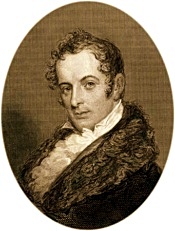 Rip Van Winkle
Rip Van Winkle
(A Posthumous Writing of Diedrich Knickerbocker)
by Washington Irving
By Woden, God of Saxons,
From whence comes Wensday, that is Wodensday,
Truth is a thing that ever I will keep
Unto thylke day in which I creep into
My sepulchre.
CARTWRIGHT
The following Tale was found among the papers of the late Diedrich Knickerbocker, an old gentleman of New York, who was very curious in the Dutch history of the province, and the manners of the descendants from its primitive settlers. His historical researches, however, did not lie so much among books as among men; for the former are lamentably scanty on his favorite topics; whereas he found the old burghers, and still more their wives, rich in that legendary lore, so invaluable to true history. Whenever, therefore, he happened upon a genuine Dutch family, snugly shut up in its low-roofed farmhouse, under a spreading sycamore, he looked upon it as a little clasped volume of black-letter, and studied it with the zeal of a book-worm.
The result of all these researches was a history of the province during the reign of the Dutch governors, which he published some years since. There have been various opinions as to the literary character of his work, and, to tell the truth, it is not a whit better than it should be. Its chief merit is its scrupulous accuracy, which indeed was a little questioned on its first appearance, but has since been completely established; and it is now admitted into all historical collections, as a book of unquestionable authority.
The old gentleman died shortly after the publication of his work, and now that he is dead and gone, it cannot do much harm to his memory to say that his time might have been better employed in weightier labors. He, however, was apt to ride his hobby his own way; and though it did now and then kick up the dust a little in the eyes of his neighbors, and grieve the spirit of some friends, for whom he felt the truest deference and affection; yet his errors and follies are remembered “more in sorrow than in anger,” and it begins to be suspected, that he never intended to injure or offend. But however his memory may be appreciated by critics, it is still held dear by many folks, whose good opinion is well worth having; particularly by certain biscuit-bakers, who have gone so far as to imprint his likeness on their new-year cakes; and have thus given him a chance for immortality, almost equal to the being stamped on a Waterloo Medal, or a Queen Anne’s Farthing.
* * *
Whoever has made a voyage up the Hudson must remember the Kaatskill mountains. They are a dismembered branch of the great Appalachian family, and are seen away to the west of the river, swelling up to a noble height, and lording it over the surrounding country. Every change of season, every change of weather, indeed, every hour of the day, produces some change in the magical hues and shapes of these mountains, and they are regarded by all the good wives, far and near, as perfect barometers. When the weather is fair and settled, they are clothed in blue and purple, and print their bold outlines on the clear evening sky, but, sometimes, when the rest of the landscape is cloudless, they will gather a hood of gray vapors about their summits, which, in the last rays of the setting sun, will glow and light up like a crown of glory.
At the foot of these fairy mountains, the voyager may have descried the light smoke curling up from a village, whose shingle-roofs gleam among the trees, just where the blue tints of the upland melt away into the fresh green of the nearer landscape. It is a little village of great antiquity, having been founded by some of the Dutch colonists, in the early times of the province, just about the beginning of the government of the good Peter Stuyvesant, (may he rest in peace!) and there were some of the houses of the original settlers standing within a few years, built of small yellow bricks brought from Holland, having latticed windows and gable fronts, surmounted with weather-cocks.
In that same village, and in one of these very houses (which, to tell the precise truth, was sadly time-worn and weather-beaten), there lived many years since, while the country was yet a province of Great Britain, a simple good-natured fellow of the name of Rip Van Winkle. He was a descendant of the Van Winkles who figured so gallantly in the chivalrous days of Peter Stuyvesant, and accompanied him to the siege of Fort Christina. He inherited, however, but little of the martial character of his ancestors. I have observed that he was a simple good-natured man; he was, moreover, a kind neighbor, and an obedient hen-pecked husband. Indeed, to the latter circumstance might be owing that meekness of spirit which gained him such universal popularity; for those men are most apt to be obsequious and conciliating abroad, who are under the discipline of shrews at home. Their tempers, doubtless, are rendered pliant and malleable in the fiery furnace of domestic tribulation; and a curtain lecture is worth all the sermons in the world for teaching the virtues of patience and long-suffering. A termagant wife may, therefore, in some respects, be considered a tolerable blessing; and if so, Rip Van Winkle was thrice blessed.
Certain it is, that he was a great favorite among all the good wives of the village, who, as usual, with the amiable sex, took his part in all family squabbles; and never failed, whenever they talked those matters over in their evening gossipings, to lay all the blame on Dame Van Winkle. The children of the village, too, would shout with joy whenever he approached. He assisted at their sports, made their playthings, taught them to fly kites and shoot marbles, and told them long stories of ghosts, witches, and Indians. Whenever he went dodging about the village, he was surrounded by a troop of them, hanging on his skirts, clambering on his back, and playing a thousand tricks on him with impunity; and not a dog would bark at him throughout the neighborhood.
The great error in Rip’s composition was an insuperable aversion to all kinds of profitable labor. It could not be from the want of assiduity or perseverance; for he would sit on a wet rock, with a rod as long and heavy as a Tartar’s lance, and fish all day without a murmur, even though he should not be encouraged by a single nibble. He would carry a fowling-piece on his shoulder for hours together, trudging through woods and swamps, and up hill and down dale, to shoot a few squirrels or wild pigeons. He would never refuse to assist a neighbor even in the roughest toil, and was a foremost man at all country frolics for husking Indian corn, or building stone-fences; the women of the village, too, used to employ him to run their errands, and to do such little odd jobs as their less obliging husbands would not do for them. In a word Rip was ready to attend to anybody’s business but his own; but as to doing family duty, and keeping his farm in order, he found it impossible.
In fact, he declared it was of no use to work on his farm; it was the most pestilent little piece of ground in the whole country; every thing about it went wrong, and would go wrong, in spite of him. His fences were continually falling to pieces; his cow would either go astray, or get among the cabbages; weeds were sure to grow quicker in his fields than anywhere else; the rain always made a point of setting in just as he had some out-door work to do; so that though his patrimonial estate had dwindled away under his management, acre by acre, until there was little more left than a mere patch of Indian corn and potatoes, yet it was the worst conditioned farm in the neighborhood.
His children, too, were as ragged and wild as if they belonged to nobody. His son Rip, an urchin begotten in his own likeness, promised to inherit the habits, with the old clothes of his father. He was generally seen trooping like a colt at his mother’s heels, equipped in a pair of his father’s cast-off galligaskins, which he had much ado to hold up with one hand, as a fine lady does her train in bad weather.
Rip Van Winkle, however, was one of those happy mortals, of foolish, well-oiled dispositions, who take the world easy, eat white bread or brown, whichever can be got with least thought or trouble, and would rather starve on a penny than work for a pound. If left to himself, he would have whistled life away in perfect contentment; but his wife kept continually dinning in his ears about his idleness, his carelessness, and the ruin he was bringing on his family. Morning, noon, and night, her tongue was incessantly going, and everything he said or did was sure to produce a torrent of household eloquence. Rip had but one way of replying to all lectures of the kind, and that, by frequent use, had grown into a habit. He shrugged his shoulders, shook his head, cast up his eyes, but said nothing. This, however, always provoked a fresh volley from his wife; so that he was fain to draw off his forces, and take to the outside of the house – the only side which, in truth, belongs to a hen-pecked husband.
Rip’s sole domestic adherent was his dog Wolf, who was as much hen-pecked as his master; for Dame Van Winkle regarded them as companions in idleness, and even looked upon Wolf with an evil eye, as the cause of his master’s going so often astray. True it is, in all points of spirit befitting an honorable dog, he was as courageous an animal as ever scoured the woods – but what courage can withstand the ever-during and all-besetting terrors of a woman’s tongue? The moment Wolf entered the house his crest fell, his tail drooped to the ground, or curled between his legs, he sneaked about with a gallows air, casting many a sidelong glance at Dame Van Winkle, and at the least flourish of a broom-stick or ladle, he would fly to the door with yelping precipitation.
Times grew worse and worse with Rip Van Winkle as years of matrimony rolled on; a tart temper never mellows with age, and a sharp tongue is the only edged tool that grows keener with constant use. For a long while he used to console himself, when driven from home, by frequenting a kind of perpetual club of the sages, philosophers, and other idle personages of the village; which held its sessions on a bench before a small inn, designated by a rubicund portrait of His Majesty George the Third. Here they used to sit in the shade through a long lazy summer’s day, talking listlessly over village gossip, or telling endless sleepy stories about nothing. But it would have been worth any statesman’s money to have heard the profound discussions that sometimes took place, when by chance an old newspaper fell into their hands from some passing traveller. How solemnly they would listen to the contents, as drawled out by Derrick Van Bummel, the schoolmaster, a dapper learned little man, who was not to be daunted by the most gigantic word in the dictionary; and how sagely they would deliberate upon public events some months after they had taken place.
The opinions of this junto were completely controlled by Nicholas Vedder, a patriarch of the village, and landlord of the inn, at the door of which he took his seat from morning till night, just moving sufficiently to avoid the sun and keep in the shade of a large tree; so that the neighbors could tell the hour by his movements as accurately as by a sundial. It is true he was rarely heard to speak, but smoked his pipe incessantly. His adherents, however (for every great man has his adherents), perfectly understood him, and knew how to gather his opinions. When anything that was read or related displeased him, he was observed to smoke his pipe vehemently, and to send forth short, frequent and angry puffs; but when pleased, he would inhale the smoke slowly and tranquilly, and emit it in light and placid clouds; and sometimes, taking the pipe from his mouth, and letting the fragrant vapor curl about his nose, would gravely nod his head in token of perfect approbation.
From even this stronghold the unlucky Rip was at length routed by his termagant wife, who would suddenly break in upon the tranquillity of the assemblage and call the members all to naught; nor was that august personage, Nicholas Vedder himself, sacred from the daring tongue of this terrible virago, who charged him outright with encouraging her husband in habits of idleness.
Poor Rip was at last reduced almost to despair; and his only alternative, to escape from the labor of the farm and clamor of his wife, was to take gun in hand and stroll away into the woods. Here he would sometimes seat himself at the foot of a tree, and share the contents of his wallet with Wolf, with whom he sympathized as a fellow-sufferer in persecution. “Poor Wolf,” he would say, “thy mistress leads thee a dog’s life of it; but never mind, my lad, whilst I live thou shalt never want a friend to stand by thee!” Wolf would wag his tail, look wistfuly in his master’s face, and if dogs can feel pity I verily believe he reciprocated the sentiment with all his heart.
In a long ramble of the kind on a fine autumnal day, Rip had unconsciously scrambled to one of the highest parts of the Kaatskill mountains. He was after his favorite sport of squirrel shooting, and the still solitudes had echoed and re-echoed with the reports of his gun. Panting and fatigued, he threw himself, late in the afternoon, on a green knoll, covered with mountain herbage, that crowned the brow of a precipice. From an opening between the trees he could overlook all the lower country for many a mile of rich woodland. He saw at a distance the lordly Hudson, far, far below him, moving on its silent but majestic course, with the reflection of a purple cloud, or the sail of a lagging bark, here and there sleeping on its glassy bosom, and at last losing itself in the blue highlands.
On the other side he looked down into a deep mountain glen, wild, lonely, and shagged, the bottom filled with fragments from the impending cliffs, and scarcely lighted by the reflected rays of the setting sun. For some time Rip lay musing on this scene; evening was gradually advancing; the mountains began to throw their long blue shadows over the valleys; he saw that it would be dark long before he could reach the village, and he heaved a heavy sigh when he thought of encountering the terrors of Dame Van Winkle.
As he was about to descend, he heard a voice from a distance, hallooing, “Rip Van Winkle! Rip Van Winkle!” He looked round, but could see nothing but a crow winging its solitary flight across the mountain. He thought his fancy must have deceived him, and turned again to descend, when he heard the same cry ring through the still evening air: “Rip Van Winkle! Rip Van Winkle!” – at the same time Wolf bristled up his back, and giving a low growl, skulked to his master’s side, looking fearfully down into the glen. Rip now felt a vague apprehension stealing over him; he looked anxiously in the same direction, and perceived a strange figure slowly toiling up the rocks, and bending under the weight of something he carried on his back. He was surprised to see any human being in this lonely and unfrequented place, but supposing it to be some one of the neighborhood in need of his assistance, he hastened down to yield it.
On nearer approach he was still more surprised at the singularity of the stranger’s appearance. He was a short square-built old fellow, with thick bushy hair, and a grizzled beard. His dress was of the antique Dutch fashion – a cloth jerkin strapped round the waist – several pair of breeches, the outer one of ample volume, decorated with rows of buttons down the sides, and bunches at the knees. He bore on his shoulder a stout keg, that seemed full of liquor, and made signs for Rip to approach and assist him with the load. Though rather shy and distrustful of this new acquaintance, Rip complied with his usual alacrity; and mutually relieving one another, they clambered up a narrow gully, apparently the dry bed of a mountain torrent. As they ascended, Rip every now and then heard long rolling peals, like distant thunder, that seemed to issue out of a deep ravine, or rather cleft, between lofty rocks, toward which their rugged path conducted. He paused for an instant, but supposing it to be the muttering of one of those transient thunder-showers which often take place in mountain heights, he proceeded. Passing through the ravine, they came to a hollow, like a small amphitheatre, surrounded by perpendicular precipices, over the brinks of which impending trees shot their branches, so that you only caught glimpses of the azure sky and the bright evening cloud. During the whole time Rip and his companion had labored on in silence; for though the former marvelled greatly what could be the object of carrying a keg of liquor up this wild mountain, yet there was something strange and incomprehensible about the unknown, that inspired awe and checked familiarity.
On entering the amphitheatre, new objects of wonder presented themselves. On a level spot in the centre was a company of odd-looking personages playing at nine-pins. They were dressed in a quaint outlandish fashion; some wore short doublets, others jerkins, with long knives in their belts, and most of them had enormous breeches, of similar style with that of the guide’s. Their visages, too, were peculiar: one had a large beard, broad face, and small piggish eyes: the face of another seemed to consist entirely of nose, and was surmounted by a white sugar-loaf hat set off with a little red cock’s tail. They all had beards, of various shapes and colors. There was one who seemed to be the commander. He was a stout old gentleman, with a weather-beaten countenance; he wore a laced doublet, broad belt and hanger, high-crowned hat and feather, red stockings, and high-heeled shoes, with roses in them. The whole group reminded Rip of the figures in an old Flemish painting, in the parlor of Dominie Van Shaick, the village parson, and which had been brought over from Holland at the time of the settlement.
What seemed particularly odd to Rip was, that though these folks were evidently amusing themselves, yet they maintained the gravest faces, the most mysterious silence, and were, withal, the most melancholy party of pleasure he had ever witnessed. Nothing interrupted the stillness of the scene but the noise of the balls, which, whenever they were rolled, echoed along the mountains like rumbling peals of thunder.
As Rip and his companion approached them, they suddenly desisted from their play, and stared at him with such fixed statue-like gaze, and such strange, uncouth, lack-lustre countenances, that his heart turned within him, and his knees smote together. His companion now emptied the contents of the keg into large flagons, and made signs to him to wait upon the company. He obeyed with fear and trembling; they quaffed the liquor in profound silence, and then returned to their game.
By degrees Rip’s awe and apprehension subsided. He even ventured, when no eye was fixed upon him, to taste the beverage, which he found had much of the flavor of excellent Hollands. He was naturally a thirsty soul, and was soon tempted to repeat the draught. One taste provoked another; and he reiterated his visits to the flagon so often that at length his senses were overpowered, his eyes swam in his head, his head gradually declined, and he fell into a deep sleep.
On waking, he found himself on the green knoll whence he had first seen the old man of the glen. He rubbed his eyes – it was a bright sunny morning. The birds were hopping and twittering among the bushes, and the eagle was wheeling aloft, and breasting the pure mountain breeze. “Surely,” thought Rip, “I have not slept here all night.” He recalled the occurrences before he fell asleep. The strange man with a keg of liquor – the mountain ravine – the wild retreat among the rocks – the woe-begone party at ninepins – the flagon – “Oh! that flagon! that wicked flagon!” thought Rip – “what excuse shall I make to Dame Van Winkle!”
He looked round for his gun, but in place of the clean well-oiled fowling-piece, he found an old firelock lying by him, the barrel incrusted with rust, the lock falling off, and the stock worm-eaten. He now suspected that the grave roysterers of the mountain had put a trick upon him, and having dosed him with liquor, had robbed him of his gun. Wolf, too, had disappeared, but he might have strayed away after a squirrel or partridge. He whistled after him and shouted his name, but all in vain; the echoes repeated his whistle and shout, but no dog was to be seen.
He determined to revisit the scene of the last evening’s gambol, and if he met with any of the party, to demand his dog and gun. As he rose to walk, he found himself stiff in the joints, and wanting in his usual activity. “These mountain beds do not agree with me,” thought Rip; “and if this frolic should lay me up with a fit of the rheumatism, I shall have a blessed time with Dame Van Winkle.” With some difficulty he got down into the glen: he found the gully up which he and his companion had ascended the preceding evening; but to his astonishment a mountain stream was now foaming down it, leaping from rock to rock, and filling the glen with babbling murmurs. He, however, made shift to scramble up its sides, working his toilsome way through thickets of birch, sassafras, and witch-hazel, and sometimes tripped up or entangled by the wild grapevines that twisted their coils or tendrils from tree to tree, and spread a kind of network in his path.
At length he reached to where the ravine had opened through the cliffs to the amphitheatre; but no traces of such opening remained. The rocks presented a high impenetrable wall over which the torrent came tumbling in a sheet of feathery foam, and fell into a broad deep basin, black from the shadows of the surrounding forest. Here, then, poor Rip was brought to a stand. He again called and whistled after his dog; he was only answered by the cawing of a flock of idle crows, sporting high in air about a dry tree that overhung a sunny precipice; and who, secure in their elevation, seemed to look down and scoff at the poor man’s perplexities. What was to be done? the morning was passing away, and Rip felt famished for want of his breakfast. He grieved to give up his dog and gun; he dreaded to meet his wife; but it would not do to starve among the mountains. He shook his head, shouldered the rusty firelock, and, with a heart full of trouble and anxiety, turned his steps homeward.
As he approached the village he met a number of people, but none whom he knew, which somewhat surprised him, for he had thought himself acquainted with every one in the country round. Their dress, too, was of a different fashion from that to which he was accustomed. They all stared at him with equal marks of surprise, and whenever they cast their eyes upon him, invariably stroked their chins. The constant recurrence of this gesture induced Rip, involuntarily, to do the same, when to his astonishment, he found his beard had grown a foot long!
He had now entered the skirts of the village. A troop of strange children ran at his heels, hooting after him, and pointing at his gray beard. The dogs, too, not one of which he recognized for an old acquaintance, barked at him as he passed. The very village was altered; it was larger and more populous. There were rows of houses which he had never seen before, and those which had been his familiar haunts had disappeared. Strange names were over the doors – strange faces at the windows – every thing was strange. His mind now misgave him; he began to doubt whether both he and the world around him were not bewitched. Surely this was his native village, which he had left but the day before. There stood the Kaatskill mountains – there ran the silver Hudson at a distance – there was every hill and dale precisely as it had always been – Rip was sorely perplexed – “That flagon last night,” thought he, “has addled my poor head sadly!”
It was with some difficulty that he found the way to his own house, which he approached with silent awe, expecting every moment to hear the shrill voice of Dame Van Winkle. He found the house gone to decay – the roof fallen in, the windows shattered, and the doors off the hinges. A half-starved dog that looked like Wolf was skulking about it. Rip called him by name, but the cur snarled, showed his teeth, and passed on. This was an unkind cut indeed – “My very dog,” sighed poor Rip, “has forgotten me!”
He entered the house, which, to tell the truth, Dame Van Winkle had always kept in neat order. It was empty, forlorn, and apparently abandoned. This desolateness overcame all his connubial fears – he called loudly for his wife and children – the lonely chambers rang for a moment with his voice, and then all again was silence.
He now hurried forth, and hastened to his old resort, the village inn – but it too was gone. A large rickety wooden building stood in its place, with great gaping windows, some of them broken and mended with old hats and petticoats, and over the door was painted, “the Union Hotel, by Jonathan Doolittle.” Instead of the great tree that used to shelter the quiet little Dutch inn of yore, there now was reared a tall naked pole, with something on the top that looked like a red night-cap, and from it was fluttering a flag, on which was a singular assemblage of stars and stripes – all this was strange and incomprehensible. He recognized on the sign, however, the ruby face of King George, under which he had smoked so many a peaceful pipe; but even this was singularly metamorphosed. The red coat was changed for one of blue and buff, a sword was held in the hand instead of a sceptre, the head was decorated with a cocked hat, and underneath was painted in large characters, GENERAL WASHINGTON.
There was, as usual, a crowd of folk about the door, but none that Rip recollected. The very character of the people seemed changed. There was a busy, bustling, disputatious tone about it, instead of the accustomed phlegm and drowsy tranquillity. He looked in vain for the sage Nicholas Vedder, with his broad face, double chin, and fair long pipe, uttering clouds of tobacco-smoke instead of idle speeches; or Van Bummel, the schoolmaster, doling forth the contents of an ancient newspaper. In place of these, a lean, bilious-looking fellow, with his pockets full of handbills, was haranguing vehemently about rights of citizens – elections – members of congress – liberty – Bunker’s Hill – heroes of seventy-six – and other words, which were a perfect Babylonish jargon to the bewildered Van Winkle.
The appearance of Rip, with his long grizzled beard, his rusty fowling-piece, his uncouth dress, and an army of women and children at his heels, soon attracted the attention of the tavern politicians. They crowded round him, eyeing him from head to foot with great curiosity. The orator bustled up to him, and, drawing him partly aside, inquired “on which side he voted?” Rip stared in vacant stupidity. Another short but busy little fellow pulled him by the arm, and, rising on tiptoe, inquired in his ear, “Whether he was Federal or Democrat?” Rip was equally at a loss to comprehend the question; when a knowing, self-important old gentleman, in a sharp cocked hat, made his way through the crowd, putting them to the right and left with his elbows as he passed, and planting himself before Van Winkle, with one arm akimbo, the other resting on his cane, his keen eyes and sharp hat penetrating, as it were, into his very soul, demanded in an austere tone, “what brought him to the election with a gun on his shoulder, and a mob at his heels, and whether he meant to breed a riot in the village?” – “Alas! gentlemen,” cried Rip, somewhat dismayed, “I am a poor quiet man, a native of the place, and a loyal subject of the king, God bless him!”
Here a general shout burst from the by-standers – “A tory! a tory! a spy! a refugee! hustle him! away with him!” It was with great difficulty that the self-important man in the cocked hat restored order; and, having assumed a tenfold austerity of brow, demanded again of the unknown culprit, what he came there for, and whom he was seeking? The poor man humbly assured him that he meant no harm, but merely came there in search of some of his neighbors, who used to keep about the tavern.
“Well – who are they? – name them.”
Rip bethought himself a moment, and inquired, “Where’s Nicholas Vedder?”
There was a silence for a little while, when an old man replied, in a thin piping voice, “Nicholas Vedder! why, he is dead and gone these eighteen years! There was a wooden tombstone in the church-yard that used to tell all about him, but that’s rotten and gone too.”
“Where’s Brom Dutcher?”
“Oh, he went off to the army in the beginning of the war; some say he was killed at the storming of Stony Point – others say he was drowned in a squall at the foot of Antony’s Nose. I don’t know – he never came back again.”
“Where’s Van Bummel, the schoolmaster?”
“He went off to the wars too, was a great militia general, and is now in congress.”
Rip’s heart died away at hearing of these sad changes in his home and friends, and finding himself thus alone in the world. Every answer puzzled him too, by treating of such enormous lapses of time, and of matters which he could not understand: war – congress – Stony Point; – he had no courage to ask after any more friends, but cried out in despair, “Does nobody here know Rip Van Winkle?”
“Oh, Rip Van Winkle!” exclaimed two or three, “Oh, to be sure! that’s Rip Van Winkle yonder, leaning against the tree.”
Rip looked, and beheld a precise counterpart of himself, as he went up the mountain: apparently as lazy, and certainly as ragged. The poor fellow was now completely confounded. He doubted his own identity, and whether he was himself or another man. In the midst of his bewilderment, the man in the cocked hat demanded who he was, and what was his name?
“God knows,” exclaimed he, at his wit’s end; “I’m not myself – I’m somebody else – that’s me yonder – no – that’s somebody else got into my shoes – I was myself last night, but I fell asleep on the mountain, and they’ve changed my gun, and every thing’s changed, and I’m changed, and I can’t tell what’s my name, or who I am!”
The by-standers began now to look at each other, nod, wink significantly, and tap their fingers against their foreheads. There was a whisper also, about securing the gun, and keeping the old fellow from doing mischief, at the very suggestion of which the self-important man in the cocked hat retired with some precipitation. At this critical moment a fresh comely woman pressed through the throng to get a peep at the gray-bearded man. She had a chubby child in her arms, which, frightened at his looks, began to cry. “Hush, Rip,” cried she, “hush, you little fool; the old man won’t hurt you.” The name of the child, the air of the mother, the tone of her voice, all awakened a train of recollections in his mind. “What is your name, my good woman?” asked he.
“Judith Gardenier.”
“And your father’s name?”
“Ah, poor man, Rip Van Winkle was his name, but it’s twenty years since he went away from home with his gun, and never has been heard of since – his dog came home without him; but whether he shot himself, or was carried away by the Indians, nobody can tell. I was then but a little girl.”
Rip had but one question more to ask; but he put it with a faltering voice:
“Where’s your mother?”
“Oh, she too had died but a short time since; she broke a blood-vessel in a fit of passion at a New-England peddler.”
There was a drop of comfort, at least, in this intelligence. The honest man could contain himself no longer. He caught his daughter and her child in his arms. “I am your father!” cried he – “Young Rip Van Winkle once – old Rip Van Winkle now! – Does nobody know poor Rip Van Winkle?”
All stood amazed, until an old woman, tottering out from among the crowd, put her hand to her brow, and peering under it in his face for a moment, exclaimed, “Sure enough! it is Rip Van Winkle – it is himself! Welcome home again, old neighbor – Why, where have you been these twenty long years?”
Rip’s story was soon told, for the whole twenty years had been to him but as one night. The neighbors stared when they heard it; some were seen to wink at each other, and put their tongues in their cheeks: and the self-important man in the cocked hat, who, when the alarm was over, had returned to the field, screwed down the corners of his mouth, and shook his head – upon which there was a general shaking of the head throughout the assemblage.
It was determined, however, to take the opinion of old Peter Vanderdonk, who was seen slowly advancing up the road. He was a descendant of the historian of that name, who wrote one of the earliest accounts of the province. Peter was the most ancient inhabitant of the village, and well versed in all the wonderful events and traditions of the neighborhood. He recollected Rip at once, and corroborated his story in the most satisfactory manner. He assured the company that it was a fact, handed down from his ancestor the historian, that the Kaatskill mountains had always been haunted by strange beings. That it was affirmed that the great Hendrick Hudson, the first discoverer of the river and country, kept a kind of vigil there every twenty years, with his crew of the Half-moon; being permitted in this way to revisit the scenes of his enterprise, and keep a guardian eye upon the river, and the great city called by his name. That his father had once seen them in their old Dutch dresses playing at nine-pins in a hollow of the mountain; and that he himself had heard, one summer afternoon, the sound of their balls, like distant peals of thunder.
To make a long story short, the company broke up, and returned to the more important concerns of the election. Rip’s daughter took him home to live with her; she had a snug, well-furnished house, and a stout cheery farmer for a husband, whom Rip recollected for one of the urchins that used to climb upon his back. As to Rip’s son and heir, who was the ditto of himself, seen leaning against the tree, he was employed to work on the farm; but evinced an hereditary disposition to attend to anything else but his business.
Rip now resumed his old walks and habits; he soon found many of his former cronies, though all rather the worse for the wear and tear of time; and preferred making friends among the rising generation, with whom he soon grew into great favor.
Having nothing to do at home, and being arrived at that happy age when a man can be idle with impunity, he took his place once more on the bench at the inn door, and was reverenced as one of the patriarchs of the village, and a chronicle of the old times “before the war.” It was some time before he could get into the regular track of gossip, or could be made to comprehend the strange events that had taken place during his torpor. How that there had been a revolutionary war – that the country had thrown off the yoke of old England – and that, instead of being a subject of his Majesty George the Third, he was now a free citizen of the United States. Rip, in fact, was no politician; the changes of states and empires made but little impression on him; but there was one species of despotism under which he had long groaned, and that was – petticoat government. Happily that was at an end; he had got his neck out of the yoke of matrimony, and could go in and out whenever he pleased, without dreading the tyranny of Dame Van Winkle. Whenever her name was mentioned, however, he shook his head, shrugged his shoulders, and cast up his eyes; which might pass either for an expression of resignation to his fate, or joy at his deliverance.
He used to tell his story to every stranger that arrived at Mr. Doolittle’s hotel. He was observed, at first, to vary on some points every time he told it, which was, doubtless, owing to his having so recently awaked. It at last settled down precisely to the tale I have related, and not a man, woman, or child in the neighborhood, but knew it by heart. Some always pretended to doubt the reality of it, and insisted that Rip had been out of his head, and that this was one point on which he always remained flighty. The old Dutch inhabitants, however, almost universally gave it full credit. Even to this day they never hear a thunderstorm of a summer afternoon about the Kaatskill, but they say Hendrick Hudson and his crew are at their game of nine-pins; and it is a common wish of all hen-pecked husbands in the neighborhood, when life hangs heavy on their hands, that they might have a quieting draught out of Rip Van Winkle’s flagon.
NOTE – The foregoing Tale, one would suspect, had been suggested to Mr. Knickerbocker by a little German superstition about the Emperor Frederick der Rothbart, and the Kypphauser mountain: the subjoined note, however, which he had appended to the tale, shows that it is an absolute fact, narrated with his usual fidelity:
“The story of Rip Van Winkle may seem incredible to many, but nevertheless I give it my full belief, for I know the vicinity of our old Dutch settlements to have been very subject to marvellous events and appearances. Indeed, I have heard many stranger stories than this, in the villages along the Hudson; all of which were too well authenticated to admit of a doubt. I have even talked with Rip Van Winkle myself who, when last I saw him, was a very venerable old man, and so perfectly rational and consistent on every other point, that I think no conscientious person could refuse to take this into the bargain; nay, I have seen a certificate on the subject taken before a country justice and signed with a cross, in the justice’s own handwriting. The story, therefore, is beyond the possibility of doubt. D. K.”
Washington Irving (1783-1859)
Rip Van Winkle (A Posthumous Writing of Diedrich Knickerbocker)
fleursdumal.nl magazine
More in: #Short Stories Archive, Archive I-J, Tales of Mystery & Imagination

Incubate is the annual celebration of cutting-edge culture. It is a festival exhibiting a diverse view on indie culture as a whole, including music, visual arts, film and contemporary theater, and a conference. For the upcoming December edition it brings more than 40+ cutting edge artists in an intimate context to an international audience. Black metal next to free jazz. Refreshing art next to innovating indie games.
Incubate takes place troughout more than fifteen venues in the inner-city of Tilburg.
Incubate – 10/11 December 2016

Incubate Zero is the part of the programme that is FREE for all to attend. A little taste of the festival so you can decide if you want more. After the success of the previous Incubate Zero programmes, we’re proud to host another free offering of artists. So make sure to bring your friends and family and check out these acts!
On December 11th, everyone can enjoy some of the best new acts from the European underground. Divided over venues Cul de Sac and Kim’s Kroeg, the following bands will perform:
Heads
HEADS. from Berlin are a loud and noisy bunch, clearly influenced by Shellac and The Jesus Lizard: the good stuff. Their first record was released by This Charming Man Records so you know this not just your average band. Come see for yourself at Cul de Sac on Sunday December 11th.
Any Other
Remember those sweet, sweet times that we call the nineties? You might, but these kids don’t because they’re way too young. They do sound like they were there though, and they do such a killer job at it we forgot all about Kim Deal or Weezer or whatever. Who are those people anyway? Any Other excel in doing their own new thing with a sound that is beloved and feels familiar.
Fake O’s
If these Groningen locals would be a black metal band they’d be considered trve kvlt without a doubt. This hardcore punk outfit sounds like they came straight from the Bay Area in the eighties and shred like they want to show Keith Morris how it’s done. Of course Keith already knows, but he’d still be into FAKE O’s.
Sven Agaath
When you think you’ve heard it all: you’re about to find out you haven’t. Sven Agaath play shoegaton (a term they probably coined themselves and for which they should receive proper recognition), a mix between shoegaze and reggaeton. They themselves call it “a mixture of Dinosaur Jr, Sean Paul, MBV and Daddy Yankee that feels urgent and natural”. Although this will probably sound horrifying to most music fans, we can assure you – it really isn’t. Sven Agaath is for everybody that likes shoegaze but also wants to dance from time to time.

The Shady Greys
The Shady Greys are an Amsterdam based dirty blues-garage duo with a nice lo-fi sound. Although using only a cajon and feet played percussions (no drums!) they’re a high energy duo with fast riffing and raw vocals.
Dead High Wire
A young band from Antwerp and Mechelen, Belgium playing a mixture of echoing postpunk and indierock. They’ve released work on Kinky Star records (La Jungle, Räpe Blossoms etc.) and Oddie Records (Teen Creeps, Mind Rays, Double Veterans etc.). These are quality labels worth a whole lot more than that ‘organic’ logo on your milk carton.
Jellephant & The Phantoms
A young guy from Arnhem named Jelle and his band called The Phantoms are psychedelic band that make us think of our fellow countrymen Yuko Yuko. With a cool, echoing lo-fi mix of psychedelica, surf and downbeat garage these kids are one of the better Dutch acts in recent years.
Wobby
Together with Tilburg natives, comic creators and founders of the small press magazine ‘Wobby’, Incubate is proud to add a Comic Fair to its December edition. This will be accompanied by an English edition of the Wobby magazine, with contributions from different artists. There will also be talks, performances and interviews, but the main event will be your chance to meet and see some of your favorite creators. Guests include Bries (BE), Sigrid Calon (NL), Charlotte Dumortier (BE), Maurice van Es (NL), Jeroen Funke (NL), KAMP HORST (NL), Knust/Extrapool (NL), Vite (BE), The Stalinskis (NL), Tieten Met Haar (BE), and Ward Zwart (BE).
Holzapfel
Incubate will finalize its two-year visual arts program Do It With Others with a special performance by German artist Olaf Holzapfel. Holzapfel is a multidisciplinary artist who has extended his practice of painting with photography, sculptures, installations and digital work. To create his architectural sculptures, Holzapfel uses a range of (often locally sourced) materials, from plastic to straw. On Saturday 10th of December Holzapfel will do a special performance with a group of participants and craftsmen, around the noble art of rope making. Making a rope from straw is a complex process, a traditional craft that few still master. Tilburg is known for its history in textiles and the use of flax and hemp, as traditionally hemp was grown for processing into rope. As Incubate always connects artists with visitors and history with contemporary art, we invite all those interested to join us and Holzapfel in this special performance.
Incubate Art Symposium
At Incubate we try to offer kicks and contemplation right next to each other. We like to learn new things while having fun; about music and art and all the wonderful things that come with it. This is why we’re delighted to host the Do It With Others symposium on December 11th at Duvelhok. Following the finissage of Olaf Holzapfel’s project the day before, the symposium will include several artists that contributed to Do It With Others over the recent years. They will be interviewed by some very interesting hosts from the Dutch contemporary art scene, discussing their past residencies and collaborative work produced in Tilburg. Make sure to catch these afternoon talks if you’re curious to meet these artists in person and ask them your questions.
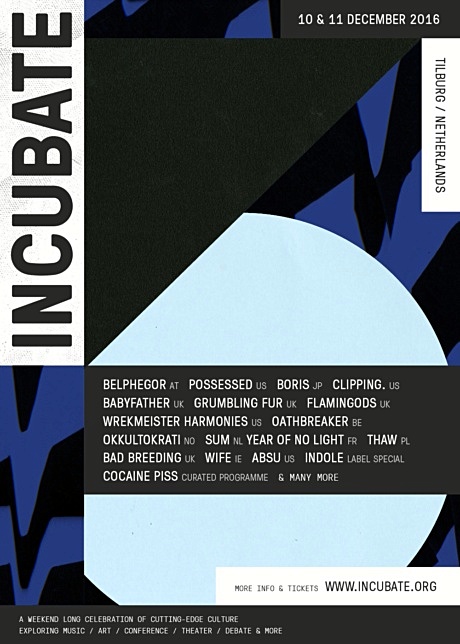
Incubate takes place troughout more than fifteen venues in the inner-city of Tilburg.
Incubate – 10/11 December 2016
incubate tilburg
Postal address
Postbus 327
5000 AH Tilburg
the Netherlands
Visiting address
NEW OFFICE:
Willem II Straat 49,
5038 BD Tilburg
Tel: +31 (0)13 590 4839
Box office opening hours:
Saturday: 12:00 – 22:00
Sunday: 12:00 – 22:00
Adress:
013 Poppodium
Veemarktstraat 44
5038 CV Tilburg
# More information on website Incubate
fleursdumal.nl magazine
More in: # Music Archive, Art & Literature News, AUDIO, CINEMA, RADIO & TV, DANCE & PERFORMANCE, DICTIONARY OF IDEAS, FDM Art Gallery, Literary Events, MUSIC, Street Art, STREET POETRY, The talk of the town, THEATRE, Urban Art

Jheronimus Bosch Art Center: ‘Jheronimus vliegt uit!’ tentoonstelling luchtschepen Sjon Brands nog te zien t/m 8 januari 2017
Als afsluiting van een lange reis langs de steden waar ooit de ‘Tuin der Lusten’ van Jheronimus Bosch vertoefde, keren de gevleugelde luchtschepen van Sjon Brands terug naar Nederland. Na de geslaagde grote tentoonstelling in het prachtige ‘Museo Lázaro Galdiano’ in Madrid zijn zij ruim twee maanden te bewonderen in het ‘Jheronimus Bosch Art Center’ in ’s-Hertogenbosch.
 De tentoonstelling ‘Jheronimus vliegt uit!’ verwelkomt vijf gevederde “kathedralen van een op hol geslagen fantasie”, beelden die onmiskenbaar doen denken aan het werk van Bosch. “Dat gevoel voor het verhalende valt samen met Bosch”, zegt Amparo Lopéz, conservator van het ‘Museo Lázaro Galdiano’, “in beide gevallen tonen zich verhalen die de kijker al spelend kan voltooien, iets wat zeer karakteristiek is voor moderne kunst”. Sergio Fanjul in ‘El País’: “Zijn fantasiebeelden zijn onuitputtelijk, vol met kleine hoekjes en tafereeltjes, zoals begrafenissen, fanfares, mensen die dode bomen dragen, Romeo en Julia in eigen persoon en zelfs actuele verwijzingen, zoals de onverschilligheid van de Europese Unie ten aanzien van Syrische vluchtelingen”.
De tentoonstelling ‘Jheronimus vliegt uit!’ verwelkomt vijf gevederde “kathedralen van een op hol geslagen fantasie”, beelden die onmiskenbaar doen denken aan het werk van Bosch. “Dat gevoel voor het verhalende valt samen met Bosch”, zegt Amparo Lopéz, conservator van het ‘Museo Lázaro Galdiano’, “in beide gevallen tonen zich verhalen die de kijker al spelend kan voltooien, iets wat zeer karakteristiek is voor moderne kunst”. Sergio Fanjul in ‘El País’: “Zijn fantasiebeelden zijn onuitputtelijk, vol met kleine hoekjes en tafereeltjes, zoals begrafenissen, fanfares, mensen die dode bomen dragen, Romeo en Julia in eigen persoon en zelfs actuele verwijzingen, zoals de onverschilligheid van de Europese Unie ten aanzien van Syrische vluchtelingen”.
De uit Tilburg afkomstige kunstenaar is erg ingenomen met deze tentoonstelling op vaderlandse bodem: “Mijn werk is best wel on-Nederlands absurd, bont en barok, iets wat wij misschien wat minder gewend zijn van kunst. Maar ik hou van het onverwachte, het onbedachte, van al onze onvolkomenheden en ondeugden, van humor dus. Net als Jheronimus Bosch. Of Kurt Schwitters. Al doende laat ik me spelenderwijs inspireren door allerlei gevonden gebruiksvoorwerpen, door mooie (afval-) materialen, hun vormen, kleuren en verhoudingen. En door het onbestemde toeval dat altijd om de hoek komt kijken. Het is een groot voorrecht ‘kunstenaar’ te mogen zijn”.
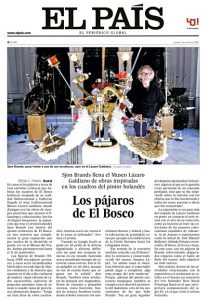 De expositie duurt nog tot en met zondag 8 januari 2017 en is van dinsdag tot en met zondag geopend van 12:00 tot 17:00 uur. ‘Jheronimus Bosch Art Center’, Jeroen Boschplein 2, 5211ML ’s-Hertogenbosch. Meer info: www.jheronimusbosch-artcenter.nl of www.sjonbrands.nl.
De expositie duurt nog tot en met zondag 8 januari 2017 en is van dinsdag tot en met zondag geopend van 12:00 tot 17:00 uur. ‘Jheronimus Bosch Art Center’, Jeroen Boschplein 2, 5211ML ’s-Hertogenbosch. Meer info: www.jheronimusbosch-artcenter.nl of www.sjonbrands.nl.
‘Jheronimus vliegt uit!’ Sjon Brands luchtschepen
Productie: Dorith van der Lee
Organisatie: ‘Jheronimus Bosch Art Center’, ‘stichting ‘Bosch y Bosco’ en de ‘stichting ‘Jheronimus Bosch 500’
Data: Van zondag 30 oktober 2016 t/m zondag 8 januari 2017
Plaats: ‘Jheronimus Bosch Art Center’, Jeroen Boschplein 2, 5211ML ’s-Hertogenbosch, tel. 073-6126890
Openingstijden: Dinsdag tot zondag van 12:00 tot 17:00 uur, maandag gesloten.
Meer informatie: www.jheronimusbosch-artcenter.nl, www.sjonbrands.nl en www.boschybosco.org
Jheronimus Bosch Art Center
Jeroen Boschplein 2 (voorheen Hinthamerstraat 175)
5211 ML ’s-Hertogenbosch
073 – 6126890
# Meer informatie op website van Sjon Brands
fleursdumal.nl magazine
More in: CATHEDRALS, Exhibition Archive, FDM Art Gallery, Jheronimus Bosch, Sjon Brands
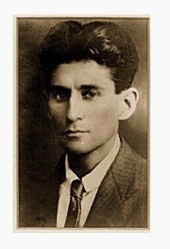 Franz Kafka
Franz Kafka
Das Schweigen der Sirenen
Beweis dessen, daß auch unzulängliche, ja kindische Mittel zur Rettung dienen können:
Um sich vor den Sirenen zu bewahren, stopfte sich Odysseus Wachs in die Ohren und ließ sich am Mast festschmieden. Ähnliches hätten natürlich seit jeher alle Reisenden tun können, außer denen, welche die Sirenen schon aus der Ferne verlockten, aber es war in der ganzen Welt bekannt, daß dies unmöglich helfen konnte. Der Sang der Sirenen durchdrang alles, und die Leidenschaft der Verführten hätte mehr als Ketten und Mast gesprengt. Daran aber dachte Odysseus nicht, obwohl er davon vielleicht gehört hatte. Er vertraute vollständig der Handvoll Wachs und dem Gebinde Ketten und in unschuldiger Freude über seine Mittelchen fuhr er den Sirenen entgegen.
Nun haben aber die Sirenen eine noch schrecklichere Waffe als den Gesang, nämlich ihr Schweigen. Es ist zwar nicht geschehen, aber vielleicht denkbar, daß sich jemand vor ihrem Gesang gerettet hätte, vor ihrem Schweigen gewiß nicht. Dem Gefühl, aus eigener Kraft sie besiegt zu haben, der daraus folgenden alles fortreißenden Überhebung kann nichts Irdisches widerstehen.
Und tatsächlich sangen, als Odysseus kam, die gewaltigen Sängerinnen nicht, sei es, daß sie glaubten, diesem Gegner könne nur noch das Schweigen beikommen, sei es, daß der Anblick der Glückseligkeit im Gesicht des Odysseus, der an nichts anderes als an Wachs und Ketten dachte, sie allen Gesang vergessen ließ.
Odysseus aber, um es so auszudrücken, hörte ihr Schweigen nicht, er glaubte, sie sängen, und nur er sei behütet, es zu hören. Flüchtig sah er zuerst die Wendungen ihrer Hälse, das tiefe Atmen, die tränenvollen Augen, den halb geöffneten Mund, glaubte aber, dies gehöre zu den Arien, die ungehört um ihn verklangen. Bald aber glitt alles an seinen in die Ferne gerichteten Blicken ab, die Sirenen verschwanden förmlich vor seiner Entschlossenheit, und gerade als er ihnen am nächsten war, wußte er nichts mehr von ihnen.
Sie aber – schöner als jemals – streckten und drehten sich, ließen das schaurige Haar offen im Winde wehen und spannten die Krallen frei auf den Felsen. Sie wollten nicht mehr verführen, nur noch den Abglanz vom großen Augenpaar des Odysseus wollten sie so lange als möglich erhaschen.
Hätten die Sirenen Bewußtsein, sie wären damals vernichtet worden. So aber blieben sie, nur Odysseus ist ihnen entgangen.
Es wird übrigens noch ein Anhang hierzu überliefert. Odysseus, sagt man, war so listenreich, war ein solcher Fuchs, daß selbst die Schicksalsgöttin nicht in sein Innerstes dringen konnte. Vielleicht hat er, obwohl das mit Menschenverstand nicht mehr zu begreifen ist, wirklich gemerkt, daß die Sirenen schwiegen, und hat ihnen und den Göttern den obigen Scheinvorgang nur gewissermaßen als Schild entgegengehalten.
Franz Kafka
(1883-1924)
Das Schweigen der Sirenen
fleursdumal.nl magazine
More in: Franz Kafka, Kafka, Franz, Kafka, Franz
Thank you for reading Fleurs du Mal - magazine for art & literature